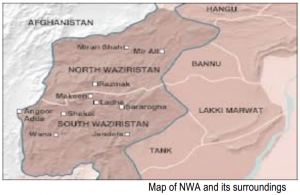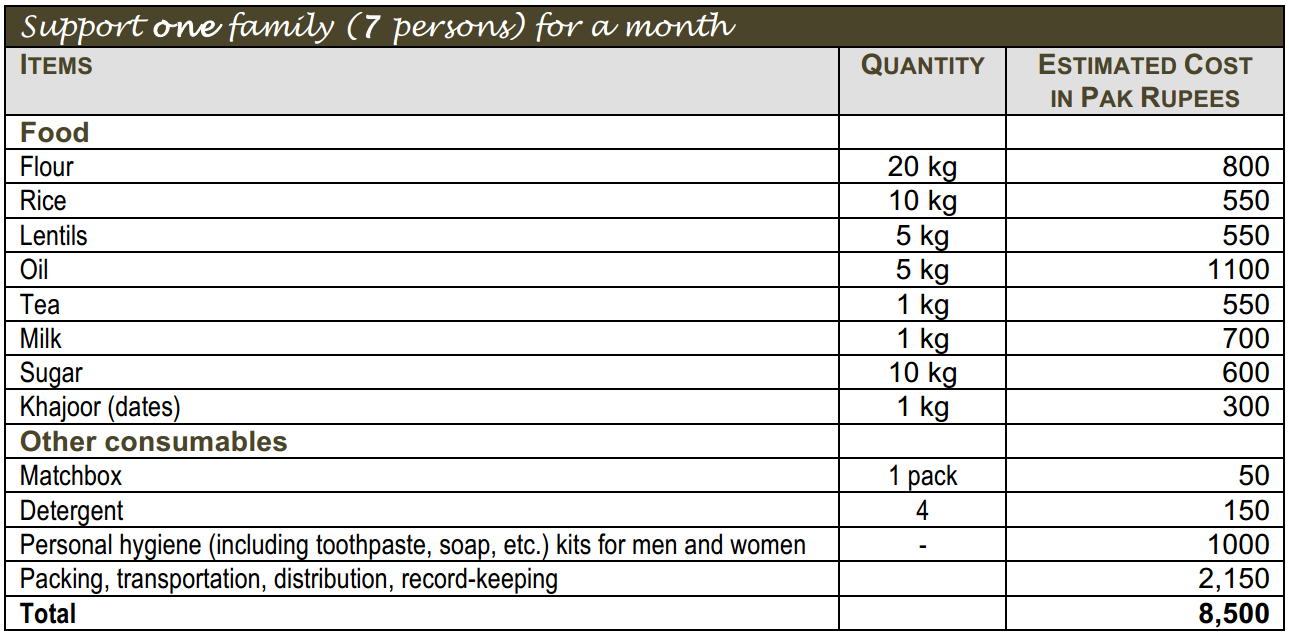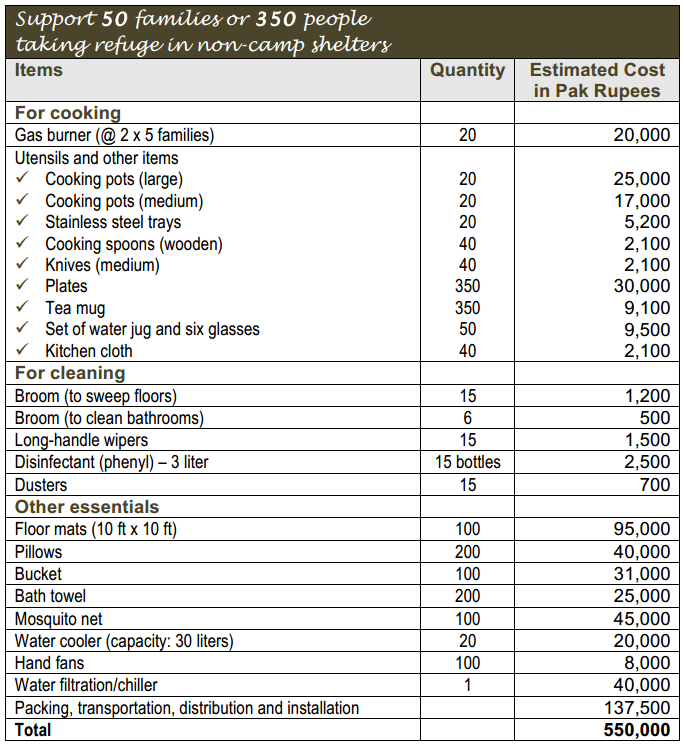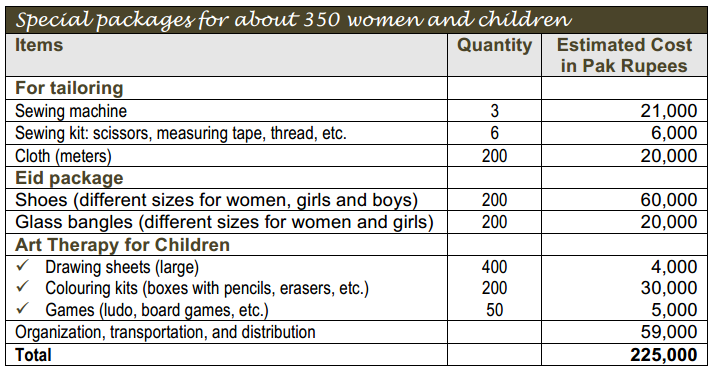Khwendo Kor & Omar Asghar Khan Foundation
North Waziristan IDPs – A Humanitarian Response
1. Introduction
On 16th June 2014 a military operation, Zarb-e-Azb, commenced in the North Waziristan
Agency (NWA) of the Federally Administered Tribal Areas (FATA). The exodus of local
people accelerated, with an estimated 450,000 people fleeing their homes by end-June
2014. The numbers continue to rise. Men, women and children covered long distances
on foot to reach safety, carrying only bare essentials. Among the Internally Displaced
Persons (IDPs), the greatest number has taken refuge in the adjoining town of Bannu in
Khyber Pakhtunkhwa (KP). Rejecting the camps set up by the government on the
grounds that they violate their strict segregation codes, the NWA IDPs have gathered in
whatever serves as temporary shelter: private hujras (part of residence reserved for
guests), public schools, factory stores, and even cattle enclosures.
Government response to this humanitarian crisis is slow, inadequate and ineffective.
After the camps were forsaken by the IDPs, the government set up distribution points
from where they provide cash grants, food and essential non-food items with the help of
the UN and other agencies. But the disbursement mechanism is extremely tedious
resulting in long queues in which old and young men stand for hours under the blazing
sun. Many have to make several trips before they receive any relief. The situation is
worse for women who do not have any male family members. Though separate
arrangements are made for them, they find the paperwork even more difficult.
The government’s key problem appears to be: too many cooks. The federal government
has authorized the military operation, which is being carried out in FATA by the armed
forces, resulting in displacement of people, a large number of whom are taking refuge in
the adjoining settled areas of Khyber Pakhtunkhwa. The federal government, the
military, the FATA administration and the provincial government of KP are all involved.
Limited coordination and shifting blame is common.
The unfolding humanitarian crisis requires prompt action and input from as many
individuals and organizations as possible. To contribute to these efforts, Khwendo Kor
(pushto meaning Women’s Home) and Omar Asghar Khan Foundation initiated: NWA
IDPs – a humanitarian response. They are working collaboratively to reach displaced
families taking refuge outside camps. They will provide food and non-food items, with
special emphasis on the needs of women. Tailored packages for children will also be
provided, helping them deal with the trauma of displacement and conflict.
In the following sections more details are provided. An outline on NWA is provided to
give a context. This is followed by information on: (a) the implementation capacity of KK
and the Foundation, (b) the specific relief packages they have drawn up and their costs,
and, (c) details on how an individual or an organization may send their contributions.
2. Context: North Waziristan

North Waziristan is one of the seven agencies that constitute FATA. The Governor of KP
is FATA’s chief executive, which has a distinct governance structure and an
administration that is independent from the provincial government of KP.
Spread across 4,707 km of rugged and mostly mountainous terrain, NWA borders Afghanistan on the west, South Waziristan on the south, and KP’s districts of Hangu and Bannu on the north and northeast. Government data showing an estimated population of about 400,000 appears unreliable as it is based on the out-of-date 1998 census, which was resisted by local people. Tribal customs reign, with the Wazirs being the dominant clan, and the reason the area is called Waziristan (land of the Wazirs).
NWA like the rest of FATA is poor. Livelihood opportunities are limited to agriculture, offfarm labour and mining. Blood feuds are common, with many lasting for many years,
with multiple generations caught in the conflict. Conditions over the past many years
have worsened. The presence of local and foreign militants has taken its toll, and further
eroded the writ of the state. Public services like education, health, clean drinking water,
or sanitation are poor or non-existent. Failing state control on governance and local
resistance to immunization led to FATA becoming the source of the greatest numbers of
polio cases in the country and the world.
Displacement has further impoverished the already poor, who have endured long
periods of local and foreign militant presence. Their interaction with the state was never
frequent, and became even less common after militants held sway in the area. They are
accustomed to FATA’s distinctive system of governance, but are largely unaware of the
working of provincial or federal governments.
3. Implementation Capacity: about us
KK and the Foundation are non-governmental organizations with demonstrated
experience of responding to disasters. They provided relief and rehabilitation assistance
to hundreds of thousands affected by the 2005 earthquake, the 2009 military action in
Malakand (including Swat) and the 2010 floods. Food and non-food items were
distributed, shelter in the form of tents and later using corrugated sheets were provided.
They initiated programmes for women and children – arranging medical camps, setting
up playgrounds and helping children deal with the trauma of conflict and displacement
with art and games.
3.1 Khwendo Kor
www.khwendokor.org.pk
KK was formed in 1993 and is registered under the Societies Act 1860 (#2614/5/2280).
Its head office is in Peshawar and it has seven regional offices in different districts of KP,
including one in Bannu that is functional since the past 11 years. KK also has a liaison
office in Islamabad. KK strives to empower women, with interventions in education,
health, economic opportunities and civil rights. Their programmes are implemented
across KP and also extend into FATA. They combine policy advocacy and service
delivery, which is effectively integrated in their efforts to build viable villages. Relief and
rehabilitation is considered a social responsibility, and included in all programmes. KK is
also registered as a charity organization in the United Kingdom under the name of UK
Friends of Khwendo Kor (UK-FROK) www.frok.org.uk.
3.2 Omar Asghar Khan Foundation
www.oakdf.org.pk
Established in 1999, the Foundation was registered in April 2000 under the Societies Act
1860 (#768/5/2873). The Foundation’s programme extends across Pakistan, with a
concentrated field presence in Khyber Pakhtunkhwa. It strives for a democratic and
peaceful society based on the values of equity, tolerance and justice in which all people
are assured a life of quality. It works with citizens, particularly the poor and the
vulnerable, to achieve human and livelihood security. The Foundation organizes citizens,
assists them in engaging with the state on policy and institutional reform, and supports
their livelihood strategies through skill-building, credit provision, and community
infrastructure development. The Foundation has a staff of 35 and offices in Islamabad
and Abbottabad.
4. NWA IDPs – A Humanitarian Response
In response to the unfolding human tragedy as hundreds of thousands of people flee the
conflict areas of the NWA, KK and the Foundation decided to work together and initiated
its: NWA IDPs – A Humanitarian Response.
4.1 Who will it reach?
The camps set up by the government are largely rejected by the IDPs, as the forced
close proximity is insensitive to their strict segregation codes. Most of the displaced
families have taken refuge in public schools and other shelters. The KK-Foundation
initiative will reach these off-camp IDPs. Initial assessments are being carried out to
identify schools and other shelters, and the number of displaced, in the town of Bannu,
which will be the programme’s immediate focus. Depending on emerging conditions and
resources, relief will be extended to other towns as well.
4.2 What support will it provide?
In each shelter the Foundation will provide food and other non-food essential items like
floor mats, hand fans, soaps, etc. The following are details of relief items per family
(average family size is 7) and per shelter (estimated 50 families per school):



5. How can you help?
You can donate cash, or give in-kind support, or volunteer your time. Cash contributions
can be made to:
Account Title: Omar Asghar Khan Development Foundation
Current Account #: 0102801010019288
Bank: MCB Bank (1028), Super Market, Islamabad-Pakistan
SWIFT Code: MUCBPKKA
IBAN#: PK11MUCB0102801010019288
All contributions are tax exempt
Tax exemption #6043/RTO/ATD/2008-09 dated 12 May.2009

